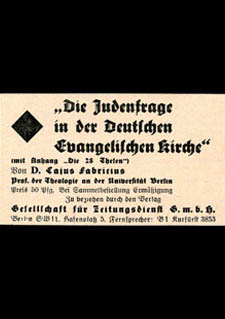The “Brown Synod” and the “Aryan Paragraph”
On April 7, 1933, Nazi leaders had enacted the “Law for the Restoration of the Professional Civil Service”. It stipulated the dismissal or early retirement of civil servants of “non-Aryan ancestry”. The German Christians demanded an equivalent provision for the church as well and thus for pastors and church officials.
In the fall of 1933, a so-called “Aryan paragraph” was introduced in several of the regional churches controlled by the German Christians. It already stipulated forced retirement when a pastor or church official had one Jewish grandparent. On September 5, 1933, the Prussian general synod – commonly known as the “Brown Synod” since many German-Christian attendees appeared in brown uniforms –passed such a resolution, which other regional churches also copied.
The planned introduction of the “Aryan paragraph” was however thwarted in the Reich Church by the objections of the Foreign Office, which still worried about Germany’s reputation abroad at this time. Around one hundred pastors in the church were affected by the “Aryan paragraph”, i.e. significantly less than one percent of the clergy and thus a comparatively small number. While the measure was clearly primarily also symbolic for the German Christians, this, of course, did not make any difference to those affected by it. They were discriminated against and persecuted.
While the German Christians argued that the “Aryan paragraph” merely concerned a question of external order, the members of the oppositional Pastors’ Emergency League considered the Aryan paragraph to be a violation of Christian beliefs in the domain of the church of Christ. The Pastors’ Emergency League had been founded as a counter movement to the “Brown Synod”. Around one third of all German pastors were members. The University of Marburg’s school of theology also declared in an opinion that the “Aryan paragraph” was clearly at odds with doctrine – unlike the University of Erlangen’s school of theology, which was unable to formulate a clear repudiation in its opinion.
Source / title
- "Die Mark" insert in the "Evangelium im Dritten Reich", No. 25, June 24, 1934, p. 100

